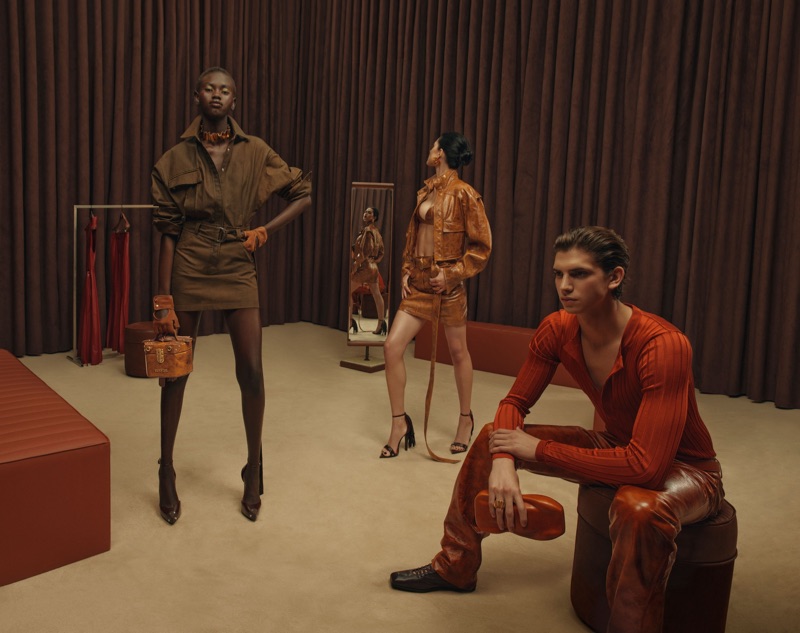[Warning: The below contains MAJOR spoilers for The Way Home Season 3 Episode 9 “Too Late to Turn Back Now.”]
With all the big moments — including time-traveling and romantic — in the penultimate episode of The Way Home Season 3, what could possibly happen in the finale? Well, it’s almost time to find out.
But first, the Hallmark Channel drama sees Del (Andie MacDowell) changing her mind about Alice (Sadie Laflamme-Snow) traveling to her past (1974) because she wants answers; Kat (Chyler Leigh) gets a big surprise when she stays back in 1816 to help Elijah (Stuart Hughes) rebuild after the town burned down his house; and Jacob (Spencer Macpherson) prepares to make a move he may live to regret.
Below, we take a look at the big moments of “Too Late to Turn Back Now” (which also features teen Del and Colton’s reunion and engagement)!
Colton’s time traveling confession to Alice
Upon learning that teen Colton (Jordan Doww) traveled to 1814 (giving Jacob some farming advice) and 1816 (saving Jacob from the fire) and what he’d been wearing the second time, Alice realizes that was after Rick’s funeral. She wonders why he kept it from her, and this is when Del decides it’s time to get answers about why her husband never told her about the pond.
And so Alice goes back to 1974 to do just that. First, she learns that Colton is heading to San Francisco to record his demo properly — Evelyn (Devin Cecchetto) is tagging along. She is invited, too, but can’t go. Once the teen girls are alone, Evelyn talks about a possible future for herself and Colton now, and Alice tries to focus on reality versus dreams. But you can’t follow dreams if you’re standing still, Evelyn argues, calling out Alice for her clear excitement about San Francisco even if she said no.
Once she leaves, someone from a nearby table in the cafe tells Alice, “She’s right, you know. About dreams. ‘Footfalls echo in the memory, down the passage we did not take, towards the door we never opened.’ It’s a quote from my favorite poet, T.S. Eliot.” What does it mean, Alice wonders. “Be the one to open the door. Fix things. Life’s too short for regrets.” Is this another time traveler?! It has to be, right?
Peter Stranks/Hallmark Media
Then Alice finds Colton at the pond, and he confesses about time traveling. After he went to 1814, however, his grandmother, Fern (Jill Frappier), was so angry: “You told them their future. You broke the rules.” She always told him the pond takes you where you need to go, so he tried to go to stop Rick’s accident. Now, it won’t work for him, and he thinks it’s because he broke the rules and told people about their futures. He’s only telling her because he thinks she, too, is a time traveler. She tells him she isn’t but she does believe him.
When Alice returns to the present, she suggests to Del that he didn’t tell her because he’d been traumatized by his two trips. He only told her because he thought she could time travel, too, but since Colton didn’t seem to recognize her in 1999, she thinks it meant she didn’t tell him in 1974.
Is Elliot Kat’s lifetime?
Back in 1816, Cyrus’ (Tim Post) injuries from the fire have left him unable to walk or speak, and so Susanna (Watson Rose) has decided she will be his voice and run Port Haven as she sees fit. He agrees.
Meanwhile, with Kat spending time in the past, Thomas (Kris Holden-Ried) wonders about their fate and admits he tried to get to her once. The pond won’t let you jump forward in time, she explains, and so if they were to pursue a relationship, she’d have to give him her life to join his. He’d never ask her to. In her time, she tells him, there’s a saying that people come into your life for a reason, a season, or a lifetime. He thinks he was just a season, but she assures him he was also a reason. Now she knows what she wants from love: unwavering support and passion and to be challenged by somebody who loves her for who she is.
Well, it seems she has found that in Elliot (Evan Williams) — who in the present finds a wire of sorts hidden in the clock he found in his wall — when he has Jacob bring him back to 1816 to help. Kat’s shocked to see him, and he kisses her. She then introduces him to Elijah, and Elliot gets to work helping. Thomas watches from the woods, and the two men acknowledge one another.
And so Elliot is there when Susanna, using her power “speaking” for Cyrus, brings people and supplies to help the Landrys rebuild. “You are my family, Katherine. My first good deed in Cyrus’ name had to be here,” she explains. Kat introduces her to “my Elliot, Elliot Augustine,” and he tells Susanna that meeting her “is a gift” and thanks her for what she’s done for the Landrys and Kat.
Alice’s step closer to a future with Max
Alice talks to Max (Dale Whibley) about Evelyn after recognizing his grandmother’s pendant on his keychain, and he shares how close they were. They got each other, both were competitive, and she was a wicked chess player. When she got sick, he couldn’t handle it, and he didn’t answer when she called the night she died. He’ll regret that for the rest of his life. Alice says Evelyn gave her grandmother a piece of advice she’ll never forget, to embrace life when you’re scared of it because you can’t follow dreams when you’re standing still. That’s the same message she left Max the night she died. They kiss, then quickly make their excuses to part ways.
Later, Alice wonders if she kissed Max because she wanted to or because she knows they get married (since she thinks Casey is their child). Kat asks if she wanted to kiss him. Yes. They leave it at that.
That’s when they discover that Alice is going to travel back to 1999 again: She plays MASH with teen Kat and Elliot, and that hasn’t happened for her yet.
Jacob’s revenge on the Goodwins
Since Cyrus Goodwin was responsible for burning his father’s house down in 1816, Jacob decides to get revenge by messing with the land of his descendent in the present-day, Lewis (Philip Riccio). He learns that if a vineyard at any stage of growth is set on fire, the soil becomes tainted and the wine that results is ultimately undrinkable.
He sneaks onto the property after hours, but Del sees his research on his computer and follows him there. Though he insists the Goodwins need to suffer, she insists he let go of the past and begs him to go home. He does, but the cameras are on recording…
What are your predictions for the Season 3 finale? Let us know in the comments section below.
The Way Home, Season 3 Finale, Friday, March 7, 9/8c, Hallmark Channel
This story originally appeared on TV Insider























